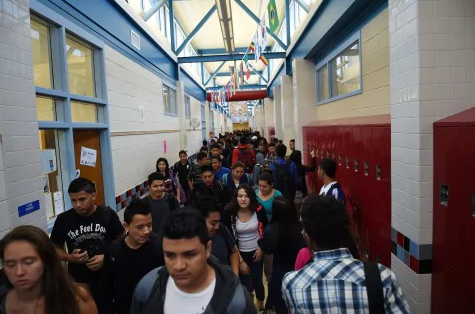Griffin Harris
The School Board, in its effort to address Alexandria’s dwindling secondary school capacity, is considering a system by which the city would have “distributed high schools.” Under this plan, students would be separated into a large handful of small high school campuses around the city, each of which would have a special focus, like, for example, a STEM campus and a career-and-technological-education campus. The proposal is one of a few concrete solutions to an increasingly pertinent issue, but its critics say that it raises more questions than it answers. Fortunately, the elite minds of The Beet have solutions.
The STEM campus, which is expected to be highly popular, will build personal robots to move students to class. Instead of security guards and police officers, hundreds of cameras with face-recognition capabilities and built-in algorithms that flag bad behavior will watch the hallways. The campus will also have its own code of conduct. Under this code, not only will swearing be a punishable offense, as it is in most high schools, but so will speaking or writing any English sentence that is even close to well-constructed–a rule that will cut costs by making language teachers unnecessary.
The sports campus will house serious varsity athletes only. Junior varsity and not-very-good-but-maybe-get-put-into-a-few-games-a-season varsity athletes will be allowed to attend other campuses, since those spazoid nerds probably want to focus on books and having their heads stuck in flushing toilets anyway. The sports campus will teach only three classes: weightlifting, sports medicine, and business. The GPA weighting system will be the same as that at other campuses, but, you know, if QB1’s got a big game this weekend and he’s not doing so hot in business class, we can probably see our way to boosting that D a little bit–I mean, we don’t want to hurt the team, right? This will prepare high-level athletes for the rigors of playing a sport at elite universities, where they will be expected to contribute meaningfully both to their team and to the academic community.
The arts and humanities campus will be home to the aspiring politicians, poets, and philosophers of the T.C. community. Each day will begin with a Socratic seminar in which students discuss the prominent issues of the day, and the campus code of conduct will encourage open debate by giving students a safe space to offer opinions that range from center-left to extreme left. The average school week will have three days of instruction and two days that are dedicated wholly to walk-outs and protests.
This solution might not answer every question about the plan, but hey–as long as some highly abstract, pretty-good sounding ideas are floated every once in a while, with no concrete plans or details ever offered, overcrowding at TC will probably solve itself, right?



